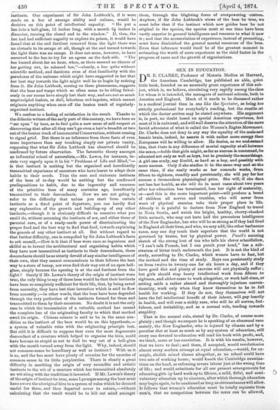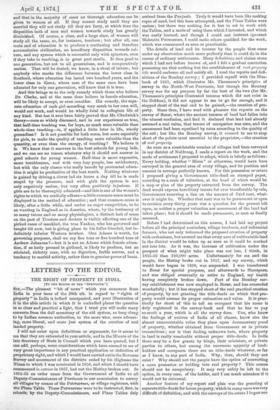SEX IN EDUCATION.
DR. E. CLARKE, Professor of Materia Medics at Harvard, the American Cambridge, has published an able, quiet little book, founded on an unusually great experience of this sub- ject, which is, we believe, circulating very rapidly among the class for whom it is intended, the managers of national schools, both in America and England. Much of it needs to be discussed rather in a medical journal than in one like the Spectator, as being too strictly professional for everybody's reading, but the results ,at which the doctor arrives may be stated anywhere. His argument is, in part, no doubt based on special American experience, but most of it is universal, and will well deserve the attention of the more fervid advocates of what is called the Women's Rights Movement. Dr. Clarke does not deny in any way the equality of the male-end female brain, indeed, he asserts it with rather more energy than Europeans will be willing to allow. He denies, as we understand him, that there is any difference of mental capacity at all between the sexes,—holds that girls might, as far as success is concerned,,te educated not only as well as boys, but in precisely the sametlaings. A girl can study, say Euclid, as hard as a boy, and possibly with more success. Only if she studies it in the same -way and .at-the same time, if she really works as her comrade works, from fifteen to eighteen, steadily and persistently, she will pay for her success a tremendous physiological price. She will, if she does not lose her health, as she will do in most cases about two years after her education has terminated, lose her right of maternitn or—and this is the more important point—will produce a breed of children all nerves and troubles, who will never from want of physical stamina take their proper place in life. Already it is painful to doctors from New England to travel in Nova Scotia, and watch the bright, healthy, cherry-cheeked little animals, who may not have half the precocious intelligence of the New Englander, but who will be as strong as if they had lived in England all their lives, and who, we may add, like other barbarous races, may one day teach their superiors that the world is not governed by brains, but by physical power. Punch's amusing sketch of the strong lout of ten who tells his clever schoolfellow, "I can't talk French, but I can punch your head," has a sub- stratum of bitter truth underneath the jest. It is not the kind of study, according to Dr. Clarke, which women have to fear, but the method and the time of study. Boys can persistently study on from twelve to twenty-one for six hours a day, and if they have good diet and plenty of exercise will not physically suffer ; but girls should stop heavy intellectual work from fifteen to eighteen, and either cease to work altogether, or work half-time, or setting aside a rather absurd and thoroughly injurious conven- tionality, work only when they know themselves to be in full health for working. If they do not, they themselves will not have the full intellectual benefit of their labour, will pay heavily in health, and will rear a sickly race, who will be all nerves, fret- fulness, and irritability, and as a normal rule, tending towards stupidity.
That is the normal rule, stated by Dr. Clarke, of course more plainly ; and though we suspect he is speaking of an abnormal race mainly, the New Englander, who is injured by climate and by a peculiar diet at least as much as by any system of education, still every one devoted to education will read his book with profit, and, we think, more or less conviction. It is with his results, however, that we have to deal ; and these, if accepted, would revolutionise almost every modern attempt at equal education,—would, for ex- ample, abolish mixed classes altogether, as no school could have two sets of working hours ; would knock the Cambridge examina- tions on the head, as enforcing severe labour just at the wrong time of life ; and would substitute for all our present arrangements for educating girls 53, hard work up to fifteen, a mild, fitful, and semi- voluntary education up to nineteen, after which thorough education may begin again, to be continued as long as circumstances will allow. It follows that women's education must be totally separate from men's, that no competition between the sexes can be allowed,
and that in the majority of cases no thorough education can he given to women at all. If they cannot study until they are married they will not study till they are forty, at which time the disposition both of men and women towards study has greatly diminished. Of course, a class, and a large class, of women will study all the same, as, for instance, teachers ; but after all, one main end of education is to produce a continuing and therefore accumulative civilisation, an hereditary disposition towards cul- ture, and any system which is successful only with spinsters, even if they take to teaching, is in great part sterile. It does good to one generation, but not to all generations, and is comparatively useless. That will be denied, we know, in a shoal of letters ; but anybody who marks the difference between the lower class in Scotland, where education has lasted two hundred years, and the lower class in Essex, where men of the same race have been educated for only one generation, will know that it is true.
And this brings us to the only remedy which those who believe Dr. Clarke, and at the same time believe in female education, will be likely to accept, or even consider. His remedy, the sepa- rate education of each girl according very much to her own will, would not work, and would be wholly fatal to collegiate life of any kind. But has it ever been fairly proved that Mr. Chadwick's theory—once so widely discussed, and in our experience so true, that half-time teaching was, for boys, so much more valuable than whole-time teaching—is, if applied a little later in life, wholly groundless ? Is it not possible for both sexes, but more especially for girls, to make the quality of teaching more valuable than the quantity, or even than the energy, of teaching ? We believe it is. We know that it answers in the best schools for young lads, and we can see no reason whatever why it should not answer in good schools for young women. Half-time is more expensive, more troublesome, and with very lazy people, less satisfactory, but with the only classes who really benefit by protracted educa- tion it might be productive of the best result. Nothing whatever is gained by driving a clever lad six hours a day till he is made stupid by the pressure, and with girls the system is not only negatively useless, but very often positively injurious. If girls are to be thoroughly educated—and this is one of the women's rights to which we cordially adhere—a little common-sense must be displayed in the method of education ; and that common-sense is likely, after a little while, and under an eager competition, to be as wanting in England as in America, where, by the testimony of so many tutors and so many physiologists, a distinct lack of sense on the part of Trustees and doctors is visibly affecting one of the picked races of mankind, the true Yankee, who has governed and taught till now, but is giving place to his fuller-blooded, but in- definitely inferior Western brother. One Adams is worth, for governing purposes, shall we say five tons or five hundred tons of Andrew Johnsons ?—but it is not an Adams which female educa- tion, if so hotly pressed in girlhood, is likely to produce, but an etiolated, ricketty man, with no digestion, feeble nerves, and a tendency to morbid activity, rather than to genuine power of brain.



































 Previous page
Previous page